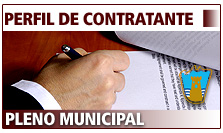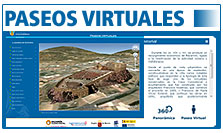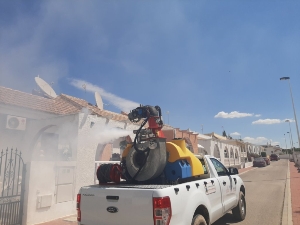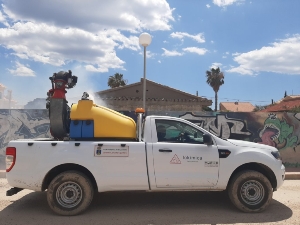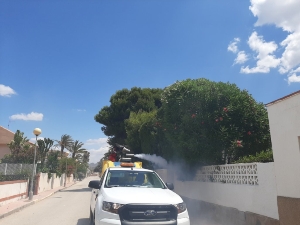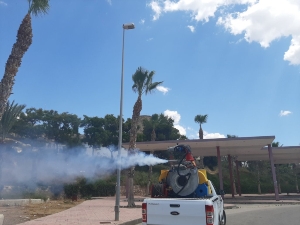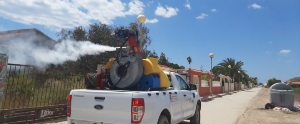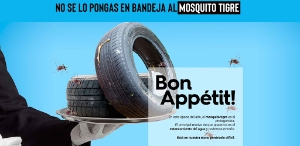THE TOWN HALL CONTINUES THE FIGHT AGAINST MOSQUITOS
Furthermore, the Autonomous Community has launched a campaign of awareness against the proliferation of the tiger mosquito
The Town Hall continues incessantly the work of disinfection against tiger mosquitos. This week the Health and Safety Department has been intensifying its work along the coastal routes, with special attention to the area of La Bahia, where many second-homes are still unoccupied, because of the restrictions relating to the State of Alarm. This produces an additional proliferation of tiger mosquitos in private properties where the Town Hall cannot intervene. Special attention has also been given to Camposol where the large number of abandoned properties throughout the urbanization creates the ideal environment for the proliferation of these insects.
Under the ironic slogan 'Bon Appétit' referring to the banquet that stagnant water means for these insects, the Authority continues to raise awareness among the population and thus avoid the transmission of diseases
The Ministry of Health today launched a campaign to prevent the proliferation of the tiger mosquito in the Region in order to reduce the discomfort they cause to people and the transmission of diseases such as Zika, dengue or chikungunya.
This insect arises from the larvae that live in small accumulations of water that remains stagnant for at least a week, so it is essential to educate the population.
In addition, 80 percent of the spaces where these vectors can inhabit are private, hence the importance of raising awareness for the population to adopt measures to prevent the proliferation of mosquitoes. Thus, under the slogan ‘Bon Appétit’, the campaign uses humour and irony about the feast these insects find in stagnant water in an animal trough or in a broken pot.
Environmental hygiene must be carried out both in the public sphere, where the municipalities are responsible and in the private sphere, where it is the property owners and users who must maintain it.
Get rid of waste and rubbish where water can accumulate such as tyres or cans; turn objects that can collect water, such as toys, ashtrays, kitchenware or watering cans, upside down; avoid accumulations of water in gutters and drains by keeping them clean to avoid clogging and applying bleach or authorized insecticides or emptying objects that hold water such as vases, flower pots or animal troughs every two or three days these are some of the main recommendations.
Also keep cisterns and tanks perfectly sealed, avoiding cracks and covering vents and covering watering cans with mosquito net, as well as keeping swimming pools and ponds clean and correctly chlorinated, and applying insecticides or using fish in ponds and fountains, avoiding invasive exotic fish species like gambusias (mosquitofish).
These insects usually bite mainly at dusk and dawn, especially on the legs and feet. For this reason, it is advisable to use repellents at those times, wear light clothing, long pants and long sleeves, exercise proper body hygiene to prevent them from being attracted by sweat and strong odours, and install mosquito nets or use electrical devices against mosquitoes.
Entomological Surveillance Program
The Public Health Authority has developed an Entomological Surveillance Program in order to monitor the distribution of this insect in our territory and to obtain activity and population parameters of it in order to manage control measures and evaluate them once they have been carried out.
In collaboration with the University of Murcia, two hundred geo-referenced sampling points have been established and distributed throughout all the municipalities in the Region. The samples are collected every two weeks by municipal technicians and the presence of tiger mosquito eggs in them is determined. In the current fortnight there are already 53 percent positive samples from 30 different municipalities.
